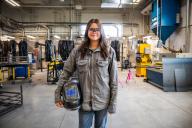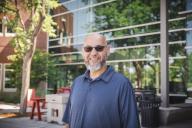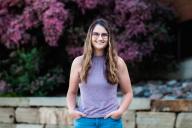For Abby Flores, Aims Community College has been more than just classes; it’s a place to grow skills, build friendships and prepare for a career in livestock management with special interests in sheep, horses and dairy cows.
Category
- Student Spotlight
Audience
- Alumni
- Faculty
- General Public
- Staff
- Students
Abby Flores Discovers a Calling in Agriculture
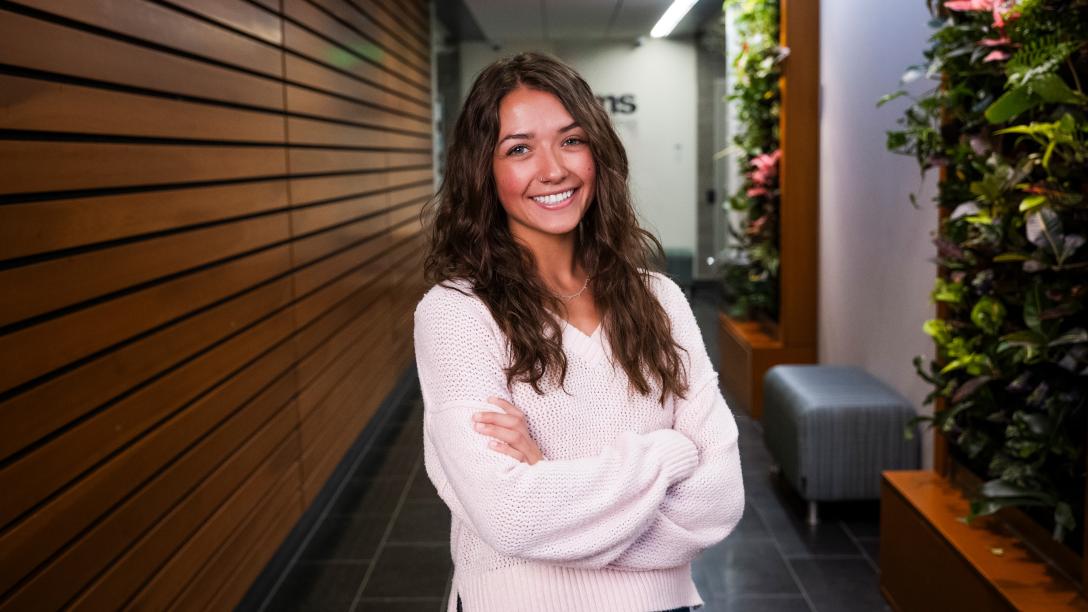
Abby always knew she wanted to work with animals, but the path to discovering her passion in ag wasn’t a straight line. Born and raised in Greeley, Colorado, Abby initially pursued horticulture at Colorado State University (CSU). When the COVID-19 pandemic disrupted her plans, she stepped away from school and built a career in hotel management. Though successful in that role, she felt something was missing.
“I was feeling unfulfilled, so I decided to enroll in school and follow my passion to work with animals,” Abby explained. That decision led her to Aims and the Animal Science Associate degree program.
Returning to school at 25 was intimidating, but Abby says the transition was made easier by the warm welcome she received at Aims. “With a phone call, I was connected with so many resources right away,” she said. “The whole process has been seamless.”
Her long-term plan may include returning to CSU to earn a bachelor’s degree in animal science. For now, she is focused on gaining practical skills and exploring different areas of agriculture.
Inspired From the Start
Abby holds a profound respect for agriculture. Her education at Aims is expanding her desire to be part of the industry.
“Farmers and ranchers are the backbone of America and the world. Everyone needs to eat, everyone needs clothing, so it feels like a very noble venture.”
After just taking an introductory course in agriculture, Abby was instantly encouraged to keep going in that direction. “The class is everything that you want it to be. For someone who's just getting into it, not totally sure if it was the right move, everything you learn right off the get-go will really capture your attention.”
Abby believes one of the best aspects of the Aims ag program is how practical and applied the coursework is. The feeds and feeding class stood out. In the course, students explored the science behind animal nutrition while taking field trips to feedlots and dairies to see it in action.
She found the livestock practicum valuable, as she gained real-world skills that she can use immediately. That course was especially impactful when industry leaders spoke to the class about their paths and insights on the business.
More opportunities at Aims are available, such as short-term certification courses. Abby underwent intensive training in artificial insemination for animals. She achieved this certification in a four-day, pass/fail training. She calls it “one of the hardest things she’s ever done.” She embraced the challenge, “We were spending time in the classroom learning about genetics and reproductive health, then you’re going out and working with cadaver models and then on live cattle. It was wild.”
In her first year, Abby has already collected impressive accomplishments at Aims. This spring, she competed at the North American Colleges and Teachers of Agriculture competition in Texas, earning second place in Ag Communications. Abby also helped her team bring home a trophy in Veterinary Science. “Walking up to get that award was just the most surreal feeling,” she said. “I never expected that, especially within my first year of studying agriculture.”
The Aims Agriculture Club further connects students to the local ag industry. This year, Abby is the club’s president. She’s particularly excited about coordinating field trips and hands-on learning opportunities. The Ag Club also gets involved in regional events like the National Western Stock Show. “The Aims Ag Club is so important because it gives students a place to start, a group of like-minded people who are into the same things,” Abby said.
The club also annually celebrates National Agriculture Day in March with Aims’ annual Ag Day event on the Fort Lupton Campus. A highlight of the day is the petting farm, where attendees, especially kids, can get up close with farm animals. The Aims Agriculture Club plays a big role in organizing and running the event, giving students leadership and outreach experience. Abby reported a big turnout this year and is excited about next year’s event.
Abby has also explored some opportunities off campus independently, such as volunteering at NOCO Humane in Loveland, caring for barnyard animals. She has also started a new position as a barn attendant at Noble Reins Equestrian in Loveland. Abby describes it as “a fantastic opportunity.” She is gaining hands-on experience in the daily care and management of a diverse range of horses. “I’m learning so much and truly love what I do,” she said.
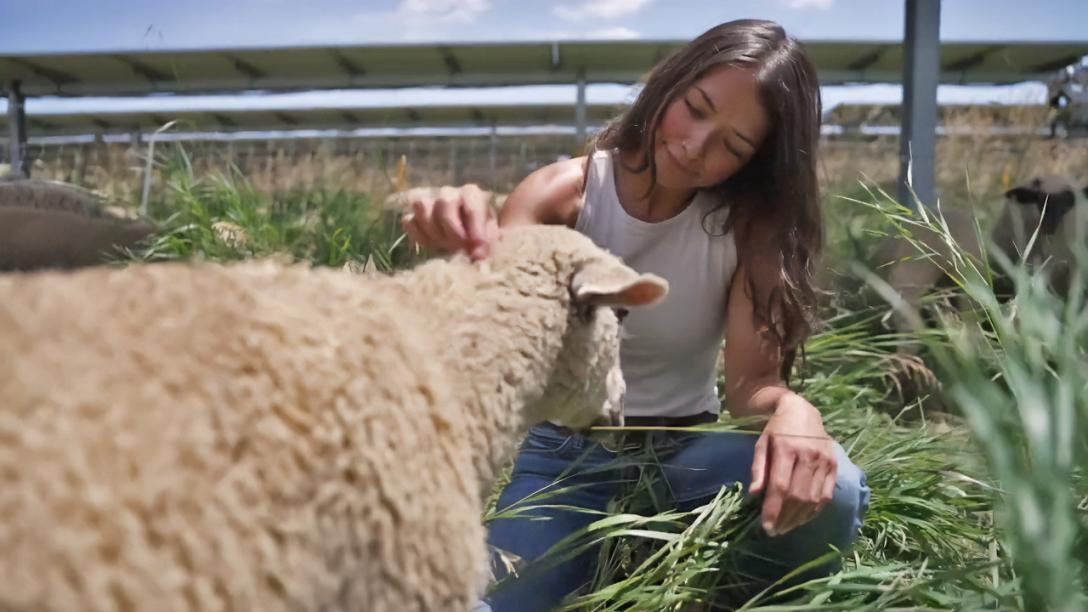
She also expanded her knowledge of agrivoltaics, where solar energy production is combined with agriculture at Jack’s Solar Garden in Longmont. Farmers are growing crops at this site and grazing sheep beneath solar panels. Shade from panels helps manage soil moisture and plant growth and provides a sustainable environment for livestock grazing. Abby described the experience as “incredible to explore.” This inspired her to think more deeply about the future of agriculture.
“I would like to explore the innovation that’s happening within agriculture. The advancements that are being made are truly incredible. I can’t wait to be a part of that.”
Growth and Gratitude
Abby believes that Aims professors do more than teach; they open doors to industry connections in Weld County agriculture. “Our teachers and faculty members have a great network in several counties in Northern Colorado. So really, if you want to explore a certain industry, then they have a point person they can put you in contact with,” she said.
Abby emphasized that one of the most significant differences between Aims and her past university experience was the individual attention from professors. “Because there are smaller class sizes, we’re able to have more hands-on experiences and do things that other schools don’t allow you to explore,” she said.
The small class size also has more benefits, like more time to ask questions, practice skills and build relationships. Professors are proactive about reaching out, offering resources and checking in outside of class.“Because we are a smaller school, we really get to know each other. If anything is happening, it’s not uncommon to get a text checking up on you or asking how an opportunity may be going.”
Abby’s mentors include Amy McFarland, the Chair of the Aims Agriculture Program and Professor Tammy Schneider. She believes they create a supportive environment for students, where leadership opportunities are encouraged. “The effort that they give, the passion that they have for their students and our success is so apparent in everything that they do,” she said.
Looking back on her journey so far, Abby credits Aims with helping her gain confidence, find mentors and grow as a person.
“Something I’ve learned this past year at Aims is that I am tough and I’m smart. When I don’t believe in myself, people behind me do.”
What she values most, though, is the community she’s found. “Everyone wants you to succeed, and that’s really apparent. Making new friendships and knowing people are there to cheer me on has made this such a better experience.”
